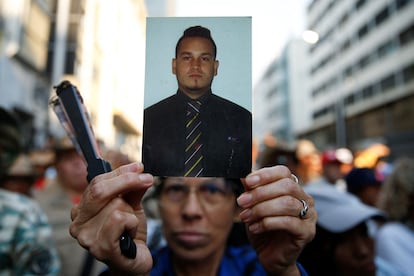Trump takes case on Venezuelan deportations to El Salvador to the Supreme Court
The U.S. administration is demanding the lifting of the ban on using an 18th-century law of war to expel irregular migrants without judicial oversight


U.S. President Donald Trump has taken a decisive step in the case involving the use of an 18th-century wartime law to deport immigrants without judicial oversight. His administration has escalated the matter directly to the Supreme Court, bypassing the lower courts. A judge had previously imposed a preliminary injunction against the application of this law, the Alien Enemies Act, when the government expelled more than 200 Venezuelan migrants to El Salvador, accusing them of being members of the Tren de Aragua criminal gang.
In a petition to the U.S. Supreme Court, the Department of Justice is seeking to lift the March 15 order issued by U.S. District Judge James Boasberg, which temporarily prohibits the deportation of the Venezuelans while courts determine the validity of the 1798 law. Although the order explicitly stated it was effective immediately, instructing that any flights carrying the migrants should turn around, the planes did not return. Instead, they transferred the migrants to El Salvador, where most were held in the notorious Terrorism Confinement Center (CECOT) for gang members under President Nayib Bukele’s regime.
Since then, Boasberg has become a target of a crackdown by the Republican administration, led by Trump, who has baselessly accused him of undermining his agenda. Trump has called Boasberg a “radical left lunatic of a judge” and demanded his dismissal, a request that prompted Supreme Court Chief Justice John Roberts to remind him that disputes over rulings should be settled through appeals, not by pressuring for a judge to be removed.
Boasberg — who is also overseeing the case into the disclosure of attack plans against Houthi rebels in Yemen in a chat between senior officials on the Signal messaging app — had asked the government for data on the flights transporting the Venezuelans to determine whether there had been contempt of court by failing to comply with the order. The Justice Department claims the planes were already over international waters when the order was issued, arguing that this meant the judge no longer had jurisdiction. It has also invoked the Official Secrets Act to deny the judge’s request for the data.
This week, the government’s position faced another setback when a three-judge appeals court upheld Boasberg’s ruling.
The Alien Enemies Act has only been invoked three times in U.S. history, each during wartime: once in 1812, again during World War I against citizens of the Austro-Hungarian Empire, and finally during World War II to intern Japanese, German, and Italian Americans in concentration camps.
The law grants the president extraordinary powers during times of conflict to expel citizens from countries at war with the United States or attempting to invade it. Trump claims, without evidence, that the Tren de Aragua criminal group controls Nicolás Maduro’s regime in Venezuela and is attempting to attack the U.S. from within.
In its petition filed on Friday, the Justice Department argues that the case of the deported Venezuelans raises the question of who should control sensitive national security operations — the president or the courts. “The Constitution supplies a clear answer: the president,” state attorneys write. “The republic cannot afford a different choice.”
Sign up for our weekly newsletter to get more English-language news coverage from EL PAÍS USA Edition
Tu suscripción se está usando en otro dispositivo
¿Quieres añadir otro usuario a tu suscripción?
Si continúas leyendo en este dispositivo, no se podrá leer en el otro.
FlechaTu suscripción se está usando en otro dispositivo y solo puedes acceder a EL PAÍS desde un dispositivo a la vez.
Si quieres compartir tu cuenta, cambia tu suscripción a la modalidad Premium, así podrás añadir otro usuario. Cada uno accederá con su propia cuenta de email, lo que os permitirá personalizar vuestra experiencia en EL PAÍS.
¿Tienes una suscripción de empresa? Accede aquí para contratar más cuentas.
En el caso de no saber quién está usando tu cuenta, te recomendamos cambiar tu contraseña aquí.
Si decides continuar compartiendo tu cuenta, este mensaje se mostrará en tu dispositivo y en el de la otra persona que está usando tu cuenta de forma indefinida, afectando a tu experiencia de lectura. Puedes consultar aquí los términos y condiciones de la suscripción digital.








































